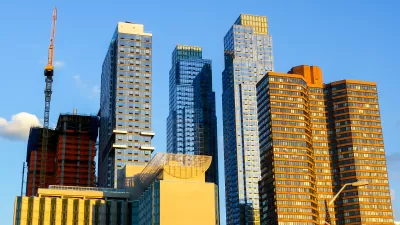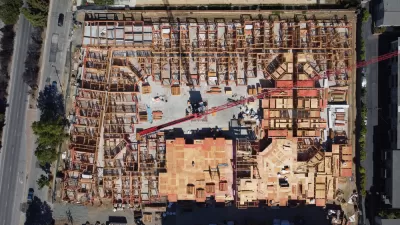Urbanist Richard Florida assesses post-pandemic possibilities for neighborhoods that once relied on 9-to-5 workers.

While other parts of cities are "springing back to life" as we shift to a post-pandemic society, "[t]he ongoing shift to remote work challenges the historic role of the Central Business Districts," writes Richard Florida in Bloomberg CityLab. Unlike museums, restaurants, and concert venues, corporate towers are not experiencing an ebullient resurgence but rather an existential crisis.
"These signature skyscraper and corporate tower districts that define the skylines of great cities, and are often synonymous with downtowns, will have to adapt. But far from killing them off, the shift to remote work will ultimately change their form and function in more subtle ways." CBDs, argues Florida, "are perfectly positioned to be remade as more vibrant neighborhoods where people can live and play as well as work — a leading-edge example of what many urbanists are now calling 15-minute neighborhoods."
To Florida, "[t]he biggest and most enduring change in our economic geography ushered in by the pandemic turns out to be far less in where and how we live, and much more about how and where we work." Business districts have recovered more slowly than other sectors, indicating a reluctance on the part of workers to return to the office despite increased vaccination rates. "It’s likely not just the fear of offices per se, but the fear of getting to and from them that remains a fundamental challenge," writes Florida. "Even as suburban office parks where people can drive to work begin to fill up, CBD office districts remain far emptier."
The decline of business in CBDs will have a powerful impact on service sector jobs. "Downtown expert Paul Levy estimates that every 500,000 square feet of occupied office space in the CBD creates jobs for 18 cleaning personnel, 12 security staff and 5 building engineers." But Florida argues that these neighborhoods have too many good qualities to simply fall into economic decline. "Their locations are just too good — too central, too dense, and with too much infrastructure and architecture — to remain vacuums for long. And their transformation — like nearly every other aspect of the Covid-19 pandemic — will be less a fundamental disruption and more an acceleration of trends already underway."
In the near future, Florida envisions central business districts repurposed into vibrant, multi-purpose hubs and the office as "less a single building in a single location, and more an outgrowth of the urban fabric." But he cautions "cities need to be intentional about how these business districts evolve: Left to their own devices, they will be remade in a way that benefits the already advantaged and deepens existing economic, social and racial divides."
FULL STORY: The Death and Life of the Central Business District

Maui's Vacation Rental Debate Turns Ugly
Verbal attacks, misinformation campaigns and fistfights plague a high-stakes debate to convert thousands of vacation rentals into long-term housing.

Planetizen Federal Action Tracker
A weekly monitor of how Trump’s orders and actions are impacting planners and planning in America.

San Francisco Suspends Traffic Calming Amidst Record Deaths
Citing “a challenging fiscal landscape,” the city will cease the program on the heels of 42 traffic deaths, including 24 pedestrians.

Defunct Pittsburgh Power Plant to Become Residential Tower
A decommissioned steam heat plant will be redeveloped into almost 100 affordable housing units.

Trump Prompts Restructuring of Transportation Research Board in “Unprecedented Overreach”
The TRB has eliminated more than half of its committees including those focused on climate, equity, and cities.

Amtrak Rolls Out New Orleans to Alabama “Mardi Gras” Train
The new service will operate morning and evening departures between Mobile and New Orleans.
Urban Design for Planners 1: Software Tools
This six-course series explores essential urban design concepts using open source software and equips planners with the tools they need to participate fully in the urban design process.
Planning for Universal Design
Learn the tools for implementing Universal Design in planning regulations.
Heyer Gruel & Associates PA
JM Goldson LLC
Custer County Colorado
City of Camden Redevelopment Agency
City of Astoria
Transportation Research & Education Center (TREC) at Portland State University
Jefferson Parish Government
Camden Redevelopment Agency
City of Claremont





























